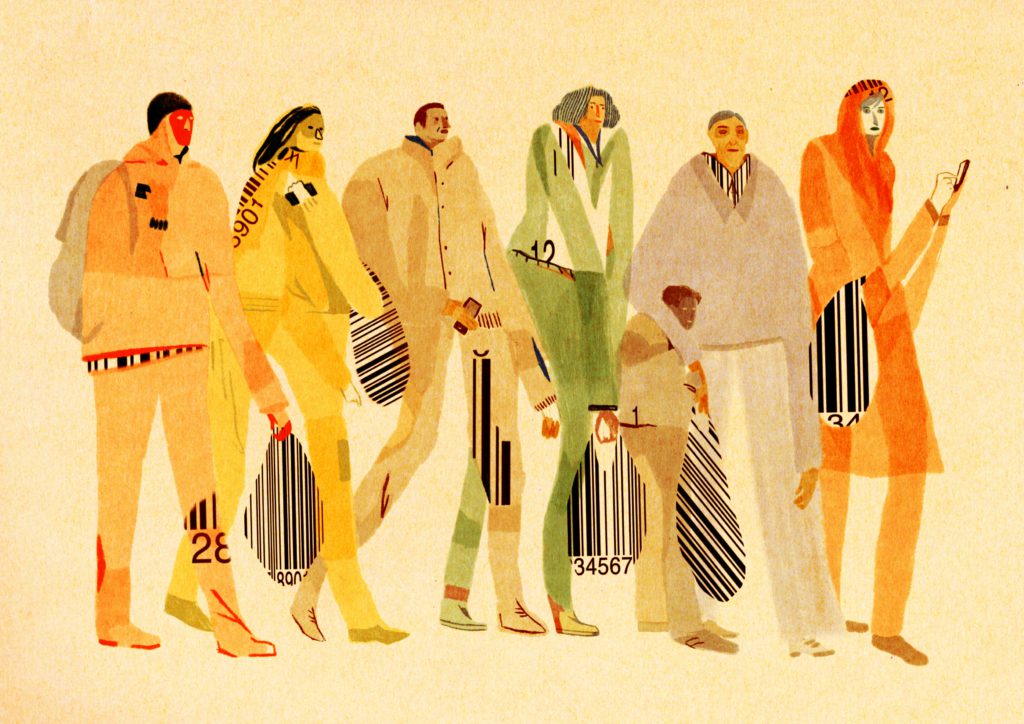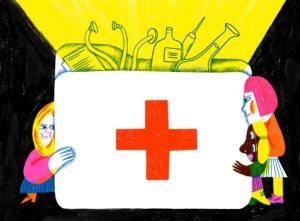
Illustrator: Pau
Description
Undocumented migrants who lack the means to cover their basic needs, receive a weekly digital supermarket voucher through WhatsApp.
This initiative is part of Direct Digital Aid, a package of three mutually enforcing digital services supporting undocumented migrants in the Netherlands. The other services are a Helpful Information Web Application and a WhatsApp Helpdesk. Direct Digital Aid has been developed by 510, the data and digital initiative of the Netherlands Red Cross.
Context
It is estimated that there are about 40.000 undocumented migrants (sometimes also called irregular migrants) in The Netherlands. This is a very diverse group, including, amongst others, people whose asylum request has been denied and the so-called unregistered economic migrants. The COVID crisis hit particularly hard on undocumented migrants. They don’t just face increased health risks, but also loss of means for subsistence (as especially the informal sector was impacted by the lockdowns) and lack of access to governmental support programmes. This is why the Netherlands Red Cross included undocumented migrants as a specific target group in their COVID response programme.
Support to undocumented migrants is challenged by the specific conditions of this group. People come from different countries, having diverse cultures and languages. Many of them move from one place to another, depending on where they manage to make a living, find shelter or support. In addition, the fact that they don’t have an official status in the country makes them trying to remain out of sight of the authorities. This however makes undocumented migrants also less visible for aid organizations.
In order to find out the best way to support these people, the Netherlands Red Cross conducted a range of interviews (co-design sessions) with both (formerly) undocumented migrants and aid workers (Red Cross and other aid organisations). From this, we learned that the most pressing issues for undocumented migrants include:
- Most undocumented migrants are not aware of their rights (for instance their right to health care).
- They often don’t know where to find support that is available to them (in the Netherlands, help for this group is scattered over many smaller and localized organizations)
- They lack money to cover their basic needs (incl. food, hygiene).
We also observed how vital mobile (smart) phones are for undocumented migrants. They depend on it to stay in touch with the wider community and to access relevant information and services during their journey and at their (temporary) destination. This made us realize that a mobile phone would be a very suitable entry point in connecting with them.
From co-designs with Red Cross staff and volunteers, we concluded that we need products and services that are:
- Flexible and easy to use (so that we can adjust or update them as per developing needs and context)
- Safe (adhering to the principle of ‘do-no-harm’)
- Scalable (easy to scale up and down depending on the scale of the crisis)
Based on these insights, 510 developed an aid package combining Digital CEA (Community Engagement and Accountability) and Digital CVA (Cash and Voucher Aid), including the digital supermarket voucher. The services are partly built around earlier developed and/or existing tools, and have been tailored to the particular context, needs and priorities of undocumented migrants in the Netherlands. Even though the three components can be seen as stand-alone services, we believe the combination of it best supports undocumented migrants towards autonomy and self-reliance.
Technical details & Operations
Undocumented migrants who need it the most, will be provided a digital supermarket voucher as a means of digital cash aid to cover basic daily needs.
By choosing vouchers as the modality, the Netherlands Red Cross adheres to the Know Your Customer procedures related to anti-money laundering legislation (which doesn’t allow digital cash for people who do not have a valid ID).
The process of registration up to distribution is completely digital. Partner organizations, who are in direct contact with undocumented migrants, provide the Red Cross with a list of phone numbers of those undocumented migrants who are most in need. The Red Cross imports these numbers in the cash aid platform, called the 121 Platform. This platform is built by 510 in consortium with humanitarian, technical, and academic partners. Through this cash aid platform, which is integrated with Twilio, the Red Cross sends an invitation to register for the voucher support through SMS to all (new) phone numbers in the platform.
By following the link that is in the invitation, the undocumented migrant enters the self-registration web-application. This web-app is available in multiple languages and gives more information about the project, including how the Red Cross treats their personal data. If the person decides to register, he/she is requested to fill in his/her name and phone number.
Once a person has registered, the registration automatically appears in the 121 portal for verification. Once included, the person starts receiving a weekly digital voucher with a barcode through WhatsApp. This barcode they can show to the cashier in the supermarket, in order to pay for their groceries. The voucher does not have to be printed, works also offline and can be used multiple times until the amount is finished.
If the undocumented migrant faces any difficulty in the registration process, the receipt or the use of the voucher, he/she can contact the Red Cross Whatsapp helpdesk, or a weekly physical helpdesk for those who have difficulties with the digital process.
The current digital voucher is valid in the biggest supermarket chain of the Netherlands. We are planning to extend to other supermarkets and types of shops as well, such as drugstores for medication and hygiene articles.
Deployment & Impact
The Netherlands Red Cross has been distributing digital supermarket vouchers since November 2021. In the first year, the Netherlands Red Cross distributed almost 25.000 digital vouchers, with a total value of EUR440.000, supporting over 1.000 undocumented migrants.
From surveys and interviews with end-users we know that they very much appreciate the digital character of the process. The digital registration, receipt and use of the voucher makes it invisible for others that they depend on humanitarian aid. This makes them feel much more human and dignified. “With the plastic card you feel shy to use it. Like everyone else is looking at it. It is more anonymous with the digital aid.”, said one of the undocumented migrants who was interviewed during the evaluation.
Also, there’s no need for queueing anymore for cash or voucher distributions, on fixed locations and timeslots. This is not only safer (e.g. because of COVID), but also much more practical for undocumented migrants. They receive the voucher on their phone, no matter where they are, as long as they are able to connect to the internet. “It is very helpful that it’s digital, because of this pandemic. There are many advantages: first, for digital vouchers we do not have to stand in line. Second, because of the virus. We don’t know who is sick. The third is you can prevent fighting sometimes. Sometimes someone comes in too late [at a physical distribution], and gets angry.” (an interviewed undocumented migrant during the evaluation).
For the Red Cross, the digital voucher aid makes that we can more easily scale up the support. And though we can’t see what people buy, we do see whether it is used, where, and how often.





